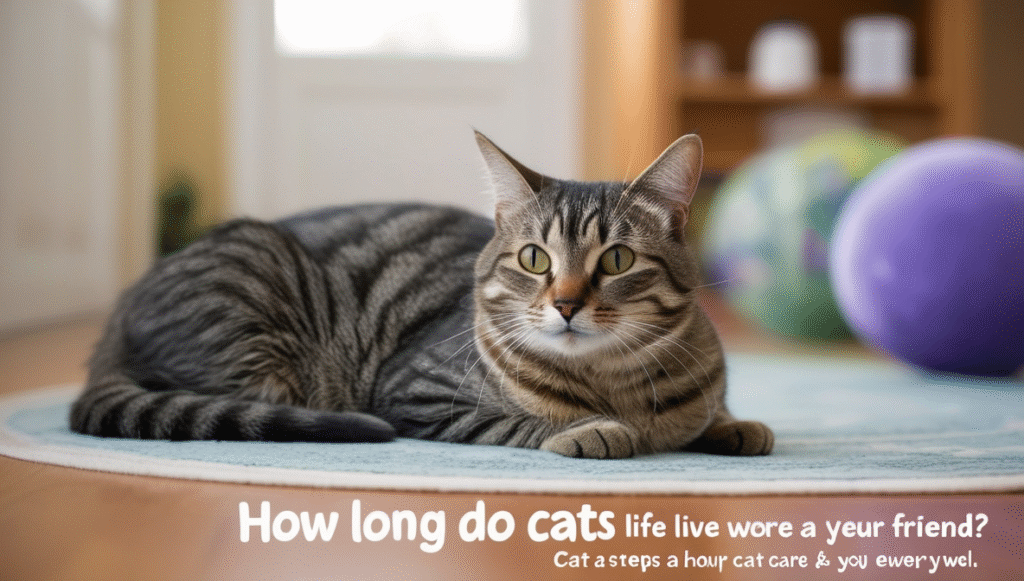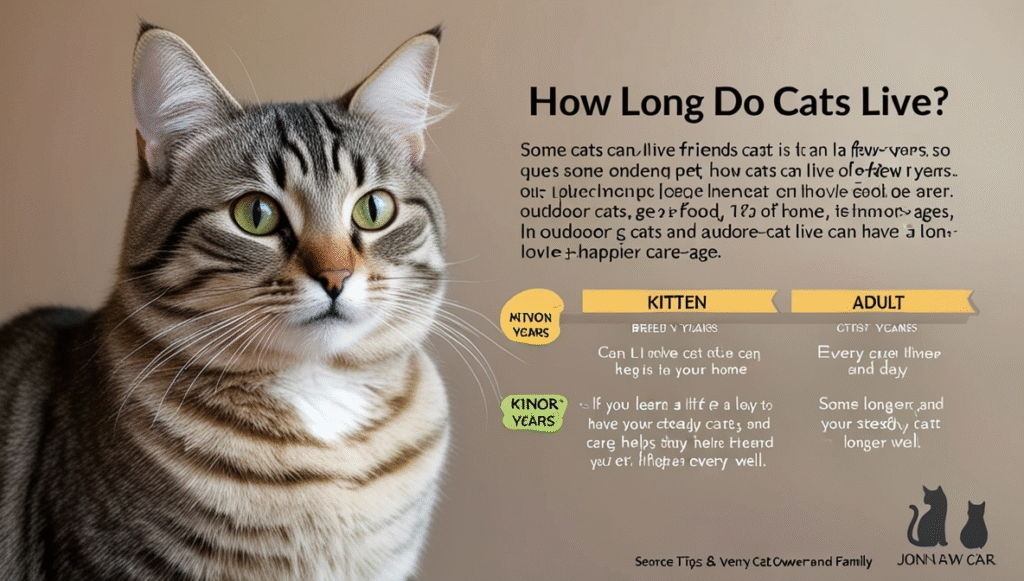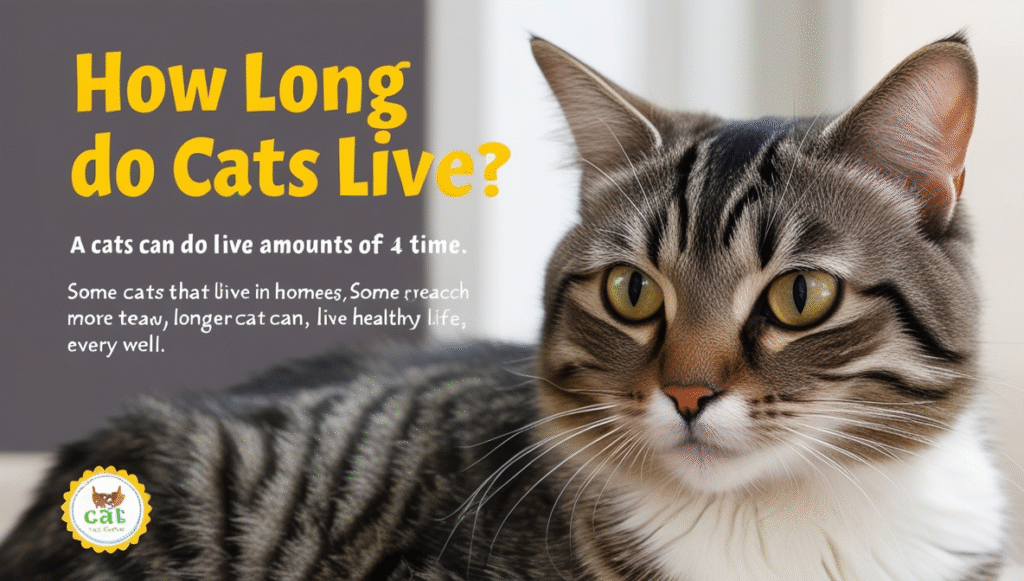how long do cats live is a question many pet friends ask. Cats can live different amounts of time. Some cats live only a few years and some live more than fourteen years. Indoor cats that live in homes often reach older ages because they get food, care, and vet checks. Outdoor cats have more risks like cars, fights, and sicknesses. The breed, size, and genes of a cat can change how long it lives. Also, good food, clean water, playtime, and love help cats stay healthy. If you learn a little about cat care and give steady love, your cat can have a longer, happier life. This guide is short and easy to read for every cat owner and family. We will talk about kitten years, adult years, and senior cat care steps that help them live well. Simple tips make a big difference for your cat every day.
how long do cats live depends on many things like care, breed, vet help, and where they live. On average, an indoor cat often lives between twelve and sixteen years, and some reach twenty years. Outdoor cats can have a shorter life because they meet dangers and get more infections. Kittens grow fast and need shots and good food to start healthy lives. Neutering or spaying keeps cats safer and can help them live longer by stopping some illnesses. Feeding the right food, giving clean water, playing every day, and regular vet checks are simple ways to protect health. Watch your cat for slow walking, change in eating, more sleep, trouble jumping, or strange litter box habits. These signs can mean your cat needs a vet visit soon. Also, keep your cat safe with ID, microchip, and a safe indoor space for sleep and play. Love and patience help a lot.
how long do cats live — simple numbers for kids
Most cats live 12 to 16 years on average. Indoor cats can sometimes live up to 20 years or more if they are very healthy and safe. Outdoor cats usually live shorter lives, sometimes only 5 to 8 years, because they face many dangers outside. The oldest cat ever recorded lived to be 38 years old, which shows that with great care, cats can live a very long time. When explaining this to kids, it’s good to say that one cat year is not the same as a human year. Cats grow much faster in the first two years and then age more slowly compared to people.
Indoor cats vs outdoor cats: life span differences
Indoor cats live longer because they stay in a safe home. They get good food every day, fresh water, and medical help when they are sick. Outdoor cats, on the other hand, face risks like cars, fights with other animals, and diseases. They may also have trouble finding food or shelter. If you want your cat to live longer, it is best to keep them indoors or give them a safe outdoor area like a catio (an outdoor cat enclosure). Cats love to explore, but safety comes first.
Common reasons cats live longer or shorter

Several things affect how long a cat lives. These include:
- Genetics: Some cats are born stronger and healthier.
- Food: Cats that eat balanced, healthy food live longer.
- Weight: Overweight cats may get health problems like diabetes.
- Environment: Indoor cats live longer than street or outdoor cats.
- Medical care: Regular vet visits help cats stay healthy.
- Accidents and dangers: Outdoor cats face more risks that can shorten life.
How food and weight change how long do cats live
Food is one of the biggest factors in cat lifespan. Cats need the right mix of protein, vitamins, and minerals. If a cat eats too much or gets too many treats, it may become overweight. Overweight cats can have heart disease, joint problems, or diabetes, which may shorten their life. Always give your cat healthy food made for its age — kitten food for young cats, adult food for grown cats, and senior food for older cats. Clean water should always be available.
Vet care and shots that help cats live longer
Vet care is very important for a long and healthy cat life. Kittens need vaccines to protect them from diseases. Adult cats need booster shots, dental care, and sometimes blood tests. Spaying or neutering also helps prevent health problems and unwanted kittens. If you take your cat to the vet at least once a year, you can catch health issues early before they become serious. This small step can add many years to your cat’s life.
How early life: kittens, teen years, and adult cat years
Cats grow quickly in the first two years of life. Kittens are very playful and need healthy food, vaccines, and lots of love. From age 2 to 6, cats are in their prime adult years. They are usually very active, curious, and strong during this time. Between 7 to 10 years, cats start slowing down a little. After 11 years, cats are often considered “seniors.” Each stage needs different care, but love and attention are important through all the years.
Senior cat signs: when a cat needs extra help

When cats become seniors, you may notice some changes. They may:
- Sleep more than before.
- Eat less or have trouble chewing.
- Move slower or have trouble jumping.
- Use the litter box differently.
These are signs that your cat needs extra help. Senior cats should visit the vet more often, maybe twice a year. Soft food, cozy beds, and gentle play can keep them comfortable.
How play, exercise, and rest help cat years
Play and exercise keep cats strong, both in body and mind. Playing with toys, climbing cat trees, or chasing laser lights helps keep them active. Exercise also stops weight gain. Rest is equally important because cats sleep about 12–16 hours a day. Balanced play and rest make cats happy and can add years to their life.
Safety tips to keep your cat living longer
To help your cat live longer, keep these safety tips in mind:
- Keep cats indoors or in safe enclosures.
- Give them ID tags or a microchip.
- Protect them from harmful foods like chocolate, onions, or grapes.
- Keep cleaning products and small objects out of reach.
- Give them fresh water and healthy food daily.
How neutering and check-ups affect cat lifespan
Neutering or spaying your cat not only prevents unwanted kittens but also lowers the risk of some cancers and infections. It can also make cats calmer and less likely to run away or fight. Regular check-ups help spot problems early. With these two steps, your cat’s lifespan can be much longer.
Fun ways to keep older cats happy and healthy

Older cats may not play as much, but they still need fun. Try puzzle feeders, soft toys, gentle brushing, or simply sitting with them. Talk to your cat, pet them gently, and give them cozy places to sleep. Small things like this keep senior cats happy and loved. A happy cat often lives longer.
Conclusion
So, how long do cats live? On average, indoor cats can live 12–16 years, with many reaching 20 years. Outdoor cats usually have shorter lives, but good food, vet care, safety, and love can make a big difference. Every cat is special, and with your care, they can enjoy many happy years by your side. If you give them attention, healthy food, and a safe home, your furry friend will not only live longer but also feel loved every day.
FAQs
Q1. What is the average lifespan of a house cat?
Most indoor cats live 12–16 years, and some reach 20 years.
Q2. Do outdoor cats live shorter lives?
Yes, outdoor cats often live 5–8 years because of risks like accidents and sickness.
Q3. Which cat breed lives the longest?
Siamese, Burmese, and mixed-breed cats often live the longest, sometimes 18–20 years.
Q4. Does neutering or spaying help cats live longer?
Yes, it prevents some diseases and makes cats safer, which helps them live longer.
Q5. What can I do to help my cat live longer?
Feed healthy food, give clean water, take regular vet visits, keep them safe indoors, and show them love every day.


